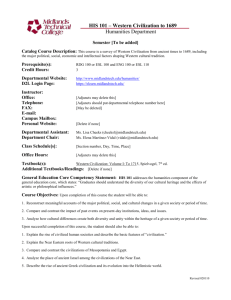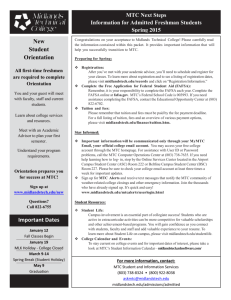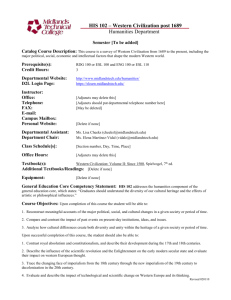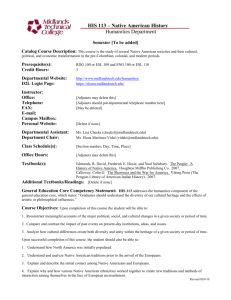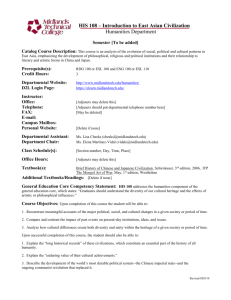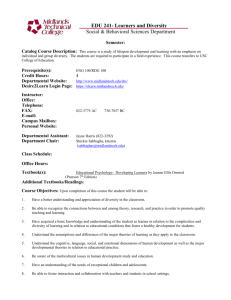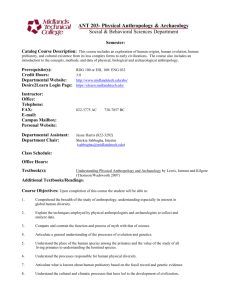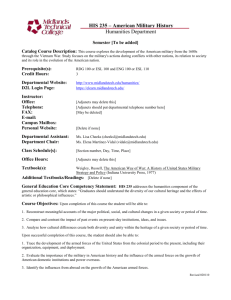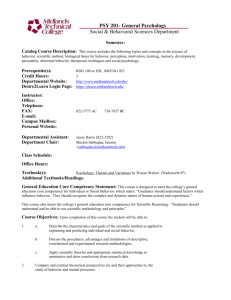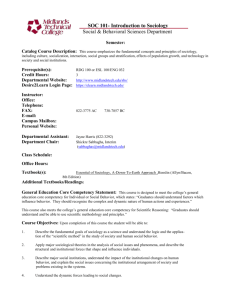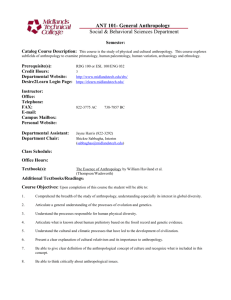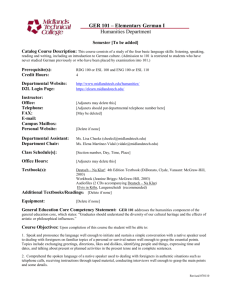History 102 Syllabus - Midlands Technical College
advertisement
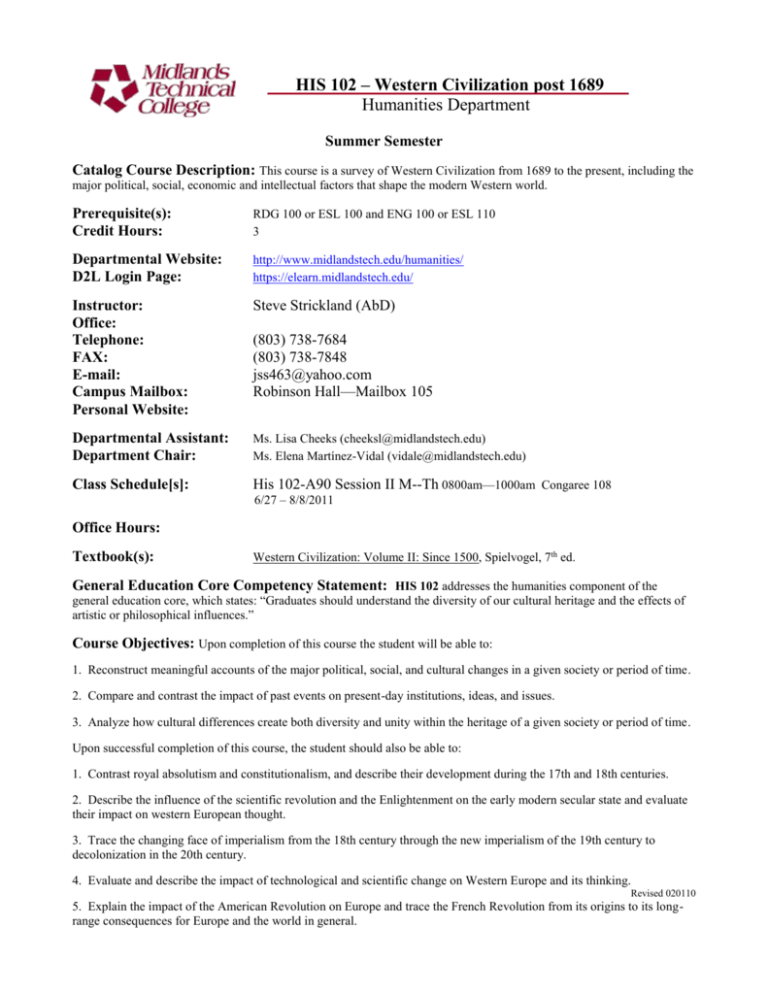
HIS 102 – Western Civilization post 1689 Humanities Department Summer Semester Catalog Course Description: This course is a survey of Western Civilization from 1689 to the present, including the major political, social, economic and intellectual factors that shape the modern Western world. Prerequisite(s): Credit Hours: RDG 100 or ESL 100 and ENG 100 or ESL 110 3 Departmental Website: D2L Login Page: http://www.midlandstech.edu/humanities/ https://elearn.midlandstech.edu/ Instructor: Office: Telephone: FAX: E-mail: Campus Mailbox: Personal Website: Steve Strickland (AbD) Departmental Assistant: Department Chair: Ms. Lisa Cheeks (cheeksl@midlandstech.edu) Ms. Elena Martínez-Vidal (vidale@midlandstech.edu) Class Schedule[s]: His 102-A90 Session II M--Th 0800am—1000am Congaree 108 (803) 738-7684 (803) 738-7848 jss463@yahoo.com Robinson Hall—Mailbox 105 6/27 – 8/8/2011 Office Hours: Textbook(s): Western Civilization: Volume II: Since 1500, Spielvogel, 7th ed. General Education Core Competency Statement: HIS 102 addresses the humanities component of the general education core, which states: “Graduates should understand the diversity of our cultural heritage and the effects of artistic or philosophical influences.” Course Objectives: Upon completion of this course the student will be able to: 1. Reconstruct meaningful accounts of the major political, social, and cultural changes in a given society or period of time. 2. Compare and contrast the impact of past events on present-day institutions, ideas, and issues. 3. Analyze how cultural differences create both diversity and unity within the heritage of a given society or period of time. Upon successful completion of this course, the student should also be able to: 1. Contrast royal absolutism and constitutionalism, and describe their development during the 17th and 18th centuries. 2. Describe the influence of the scientific revolution and the Enlightenment on the early modern secular state and evaluate their impact on western European thought. 3. Trace the changing face of imperialism from the 18th century through the new imperialism of the 19th century to decolonization in the 20th century. 4. Evaluate and describe the impact of technological and scientific change on Western Europe and its thinking. Revised 020110 5. Explain the impact of the American Revolution on Europe and trace the French Revolution from its origins to its longrange consequences for Europe and the world in general. 6. Explain the rise and significance of liberalism, socialism, romanticism, nationalism, modernism, and totalitarianism. 7. Explain the unification of Germany and Italy and evaluate its consequences, especially its impact on the causes of the World Wars of the twentieth century. 8. Describe the World Wars and explain the causes and consequences of each. 9. Trace the rise of the Soviet Union and the United States as world powers and explain the history of the Cold War through 1990. 10. Explain the roles of significant racial, cultural and religious minorities in the West. Program and course assessment activities are deployed and results collected in accordance with the College’s assessment schedule. Please refer to the information in the syllabus regarding the applicability of the assessment activity for the current semester. Course Outcomes and Competencies: Intended Course Outcome #1: Students will critically analyze the diversity of cultural heritage and the effects of artistic or philosophical influences upon culture through their study of the Western Civilization since 1500. Course Competency (Performance Measure): Students completing the learning objectives of Western Civilization to 1689 will demonstrate their critical analysis of the diversity of cultural heritage and the effects of artistic or philosophical influences upon culture through a set of locally developed exams. Measurement Instrument: At least 75 percent of all students completing HIS-102 will be able to pass identification and evaluation type exam questions created by the faculty. Course Attendance: Each student is expected to attend ALL classes and is responsible for classwork, homework, lecture notes, and reading assignments, whether present or absent. In the event of circumstances beyond one's control, such as illness, the student is allowed to miss no more than twice the number of weekly class meetings or _2____. Exceeding the maximum allowed absences in this course means that the student can receive NO CREDIT for the course, and the instructor will assign the student a grade of W or WF. A student entering class from 1-10 minutes late is considered TARDY. Three tardies equal one absence. Any student entering more than 10 minutes late is considered ABSENT. Students are expected to remain in class for the entire period. Courteous, attentive behavior is expected at all times. Tardiness to class, speaking out of turn (or when instructor is speaking), sleeping in class, receiving calls on cell phones/pagers, etc. are behaviors that are disrespectful and disruptive to everyone in the class and will not be tolerated. Withdrawal: Should the maximum allowable absences be exceeded prior to midterm, a "W" will be submitted to the registrar to be recorded on the student's transcript. Should the maximum allowable absences be exceeded after midterm, a "W" will be submitted to the registrar if the student was passing the course at the time of withdrawal OR a "WF" will be submitted if the student was failing the course at the time of withdrawal. Course Requirements: There will be between three (3) and Five (5) semester exams (time permitting). Each exam will be afforded equal weight totaling 80% of the final grade. The student will also be responsible for a Book review weighing 10% (more on book review in class). The Book Review is due at class time on July 28th . Late book reviews will be accepted, but at a ten (10) point reduction for every day it is late (Emailed assignments will not be accepted). A mandatory cumulative final will be administered on Aug 1st 8am to 10am. It will weigh 10% of the final grade. There will not be any make-up exams offered. Make up exam will be administered in the Test Lab. It is the students responsibility to locate and familiarize themselves with the hours of operation of the testing center. The student will also have the option of dropping ones lowest grade and replacing it with the grade on the final exam. The final must be taken, no exceptions. If there is a take home exam, it must be turned in at specified time. There are no make ups for the Take Home exam. Though the final exam grade may be substituted for the lowest exam, it must be an in-class exam and it must be one that was taken at the specified time. ALL EXAMS WILL BE ANNOUNCED AT LEAST ONE WEEK IN ADVANCE OF ADMINISTERING SAID EXAM. Final: This course includes a final exam, which in part, has approximately 20-30 multiple choice questions covering the entire course. The instructor will provide a review for these questions. The instructor may also add to, or incorporate other questions as a part of the course final. Course Grading: Exams Book Review Mandatory Final 80% 10% (10 pts for late) 10% Grading Scale: 90-100 80-89 70-79 60-69 0-59 Classroom Rules/Other: [Delete if none or expand as needed] A B C D F Superior Work Good Work Average Work Below Average Work Unsatisfactory Work **Important** Cell phones must be turned off—not to vibrate, but OFF! Any violation of this rule will result in consequences at the Instructor’s discretion! Because of previous issues of cheating, emailing, and websurfing, laptops will be scrutinized! Course Outline/Readings: The following is a tentative schedule of how the course will unfold. Jun 27th – Jun 30th Chapters 1-4 July 5th – July 7th Chapters 5-7 (Perpetua Movie, Dark Ages Movie) July 11th – July 14th Chapters 8-10 (Crusades Movie) July 18th – July 21st Chapters 10-13 (Dissenters and Artists Movie) July 25th -- July 28th Chapters 14-16 (Renaissance and Science Movie) Aug 1st -- Last Day of Regular Class Course Calendar: Week 1 First Humans and Origins Mesopotamia and Sumer Egypt and Hittites The Hebrews and Judaism Israelites and Babylon Persian Empire Week 2 Languages and Culture a Hebrew Gift to Western Culture Greece Minoans Mycenaens The Greek Dark Ages and Homer City-States and Pericles Tyrants and Democracy Week 3 The Hellenistic World Alexander the Great Rome (the Republic0 Rome (the Empire) Rome (Decline) Week 4 Christianity (Jesus) Islam (Muhammed) Constantine Justinian Week 4 Clovis and Charlemagne Carolingian Empire The Vikings Medieval World The Early Middle Ages Medieval Intellectualism The Black Death Week 5 The Reformation The Rise of European Kingdoms The Papcy The Investiture Week 6 Renaissance New World Encounters State Building and Nationalism Limited Monarchies and Republics Science and Modernity June 27 1st day of class session II July 4th College Closed July 28th Book Review due Aug 1st Mandatory Final Exam College Policies and Expectations ――――――――――――――――――――――――――――――――――― Students are expected to read the MTC Student Handbook and abide by its policies. Some of the more important policies that impact your academic work are listed below. The Handbook is located on the web: http://www.midlandstech.edu/planner/ . Academic Integrity: The students of MTC have adopted the following Honor Code: As a member of the Midlands Technical College community, I will adhere to the college’s Student Code. I will act honorably, responsibly, and with academic integrity and honesty. I will be responsible for my own academic work and will neither give nor receive unauthorized or unacknowledged aid. I will behave courteously to all members of the MTC community and its guests and will respect college property and the property of others. Academic dishonesty includes, but is not limited to, cheating on tests, plagiarism, collusion, and falsification. Such actions will result in discipline. Cheating on tests includes copying or presenting someone else’s work as your own, using unauthorized materials during a test, gaining unauthorized access to or information about a test, or collaborating with any other person during a test without permission. Plagiarism is taking another person’s work and using it without giving the source credit in any graded assignment. For more information about academic dishonesty, see Appendix I at the end of the MTC Student Handbook. Campus Emergency Protocol: To report safety concerns or suspicious activities: Call Campus Security at 7850 (on campus) or 738-7850 (cell phone or off campus). To report a security emergency: Call Campus Security at 738-7199 or dial local 911 immediately. The college also provides emergency call boxes; look for these red call boxes in or near parking lots on all campuses. If a college-wide emergency occurs, the college will communicate additional information and instructions in a number of ways, including the MTC Information Centers, campus loud speakers, email, the MTC web site, and MTC Alerts! To sign up for MTC Alerts! and receive emergency text messages on your cell phone, go to http://www.midlandstech.edu/mtcalerts/. Inclement Weather Policy: If weather conditions or other emergencies cause the college to close or open late, announcements will be made over local radio and TV stations, on the MTC web site, and on the college’s information line (803-738-8234). Check for separate announcements for day and evening classes because weather conditions can change. Announcements will be sent to students via MTC Alerts! and emailed via CampusCruiser when possible. Your class schedule in inclement weather: In standard non-lab and non-clinical classes, if the college closing or reopening means that there is at least 30 minutes of a class remaining, plan to attend that class. For example, if the college opens at 10:00 am, classes that normally meet at 8:00 am will not meet, but classes that normally begin at 9:35 am will begin at 10:00 am. Similarly, if the college closes at 8:00 pm, 6:00 pm classes will meet for their regular time, but 7:35 pm classes will not meet. Check your syllabus for specific information about the inclement weather policy for that course. Student Email Accounts: All MTC students are assigned a college email account called CampusCruiser. Follow the link on the Enrolled Students page to access your account (look under Online Resources). The college will communicate with students using CampusCruiser. You are responsible for checking your college email regularly for important information and announcements about registration, financial aid, cancelled classes, emergencies, etc. In addition to using CampusCruiser email, students may also be required to communicate with instructors through Desire to Learn (D2L), the college-wide learning management system, or through course-specific software, such as MyMathLab. MTC Online: The college conducts business with students through MTC Online. MTC Online provides many services and resources, including access to transcripts, grades, and your program evaluation; information about your financial aid status; and how to search and register for courses. Follow the link on the Enrolled Students page under Online Resources. Class Attendance and Participation: Students are responsible for meeting all attendance and participation requirements outlined in each course syllabus. Student Evaluation of Instruction: Toward the end of the semester, students will be encouraged to participate in evaluating their courses. You can complete this confidential evaluation through MTC Online, using your username and password. Announcements will be made during the term concerning how and when to do the online evaluation. Children on Campus: Children are generally not permitted on campus except for special events. Children are not permitted in classes, labs, or advisors’ offices. Children can never be left unattended on campus, including in parking lots. Students Requiring Special Accommodations: If a student with a disability requires special accommodations, the student should go to Counseling Services in the Student Center on Beltline or Airport Campus. Documentation regarding a specific disability is required in order for special arrangements to be made. All information received will remain confidential. For more information, follow the Disability Resource Centers link under Online Resources on the Enrolled Students page. PLEASE NOTE: Should change become necessary, the instructor reserves the right to adjust the requirements, pace, or scheduling of this course. Any change will be announced in class before it becomes effective.
